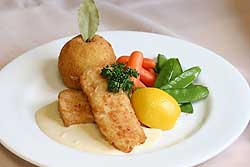Haddock Nutrition Facts

"Like other fish, haddock is an excellent source of B-complex vitamins and essential trace minerals, including potassium, iron, phosphorus, copper, iodine, manganese, cobalt, and selenium," says Dr. Barry Sears in his book The Top 100 Zone Foods. Recent studies indicate that a meal or two of fish each week may also help reduce cholesterol levels. Like cod, its white-fish cousin, haddock contains a modest amount of heart-healthy Omega-3 fatty acids, though not nearly as much as salmon.
Haddock is as an excellent source of protein. Proteins consist of 'building blocks' called amino acids. Amino acids are divided into 'essential' and 'non-essential' categories. Essential amino acids are those amino acids, which we humans are not able to synthesize in sufficient quantities to meet our daily needs and that must be supplied by the food we eat. Non-essential amino acids are manufactured in the human body in adequate quantities to meet our daily needs.
Haddock has fewer calories than a similar-size portion of meat. Haddock and beef are both about 18 percent protein, but the haddock has only about 22 calories per ounce, while regular ground beef has about 80 calories per ounce.
|